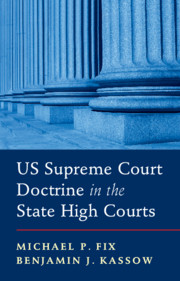Judges are not the first political officials that come to mind when one considers the role of social media in modern politics. Following in the wake of some prominent judicial personalities adopting Twitter, however, a growing number of state high court judges have adopted and established more public personas on the platform. Judges use Twitter in substantively different ways than traditional elected officials (Curry and Fix 2019); however, little is understood about how the use of such social media platforms affects broader judicial networks. Recognizing that judges, like typical social media users, may aspire to expand their networks to build and appeal to broader audiences, we contend that active participation in judicial Twitterverse could yield personal and professional advantages. Here, we address a currently unexplored question: To what extent have judges formed a distinctive “judicial network,” on Twitter, and what discernible patterns present in these networks? Leveraging the unique structure of social media, we collect comprehensive network data on judging using Twitter and analyze what institutional and social factors impact greater power within the judicial network. We find that early adoption, electoral concerns, and connective links between judges all impact the strength of the judicial network, highlighting the complex motivations driving judicial Twitter engagement, and the significance of network building in judges’ social media strategies and its potential impact on career advancement.


